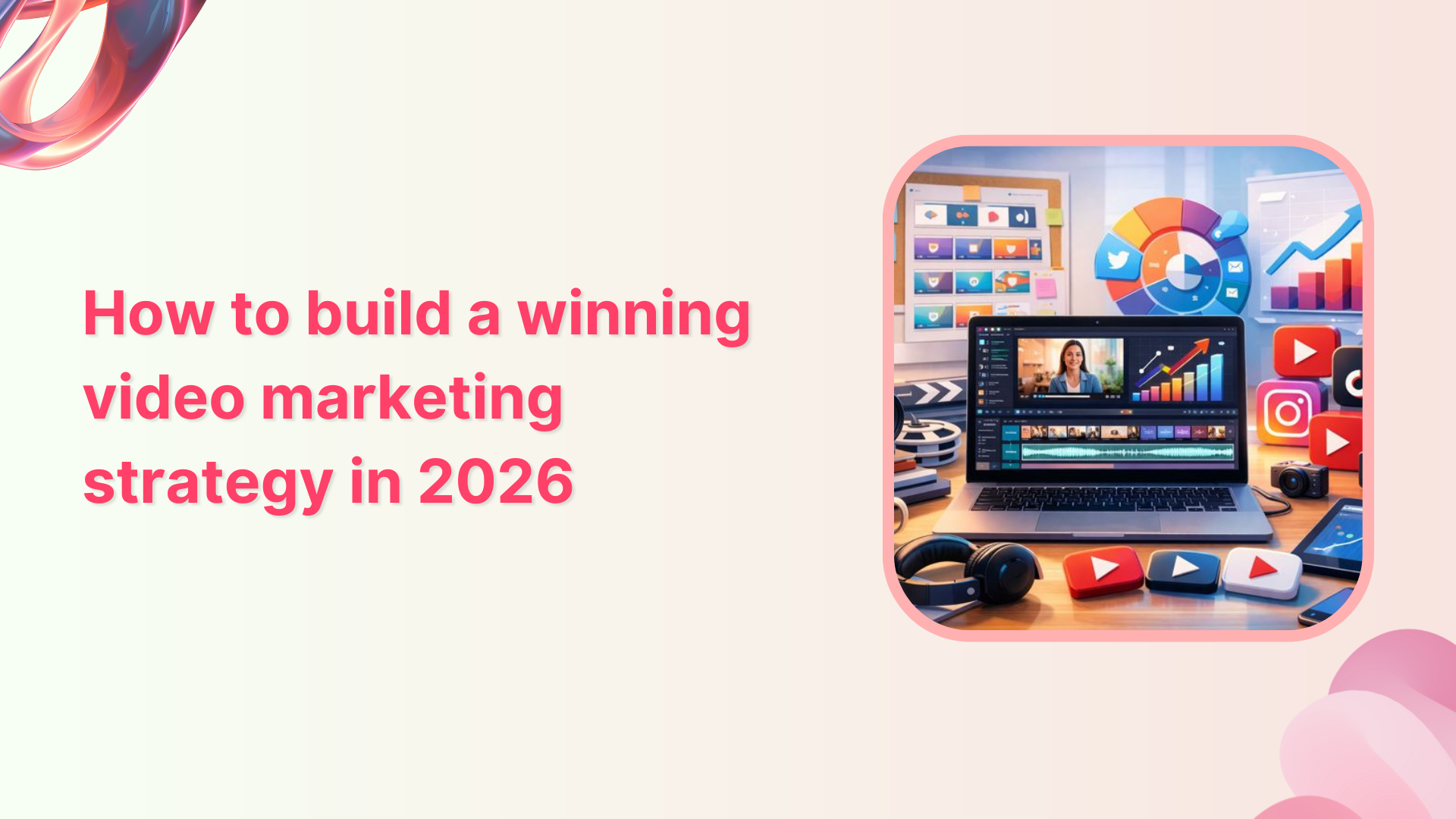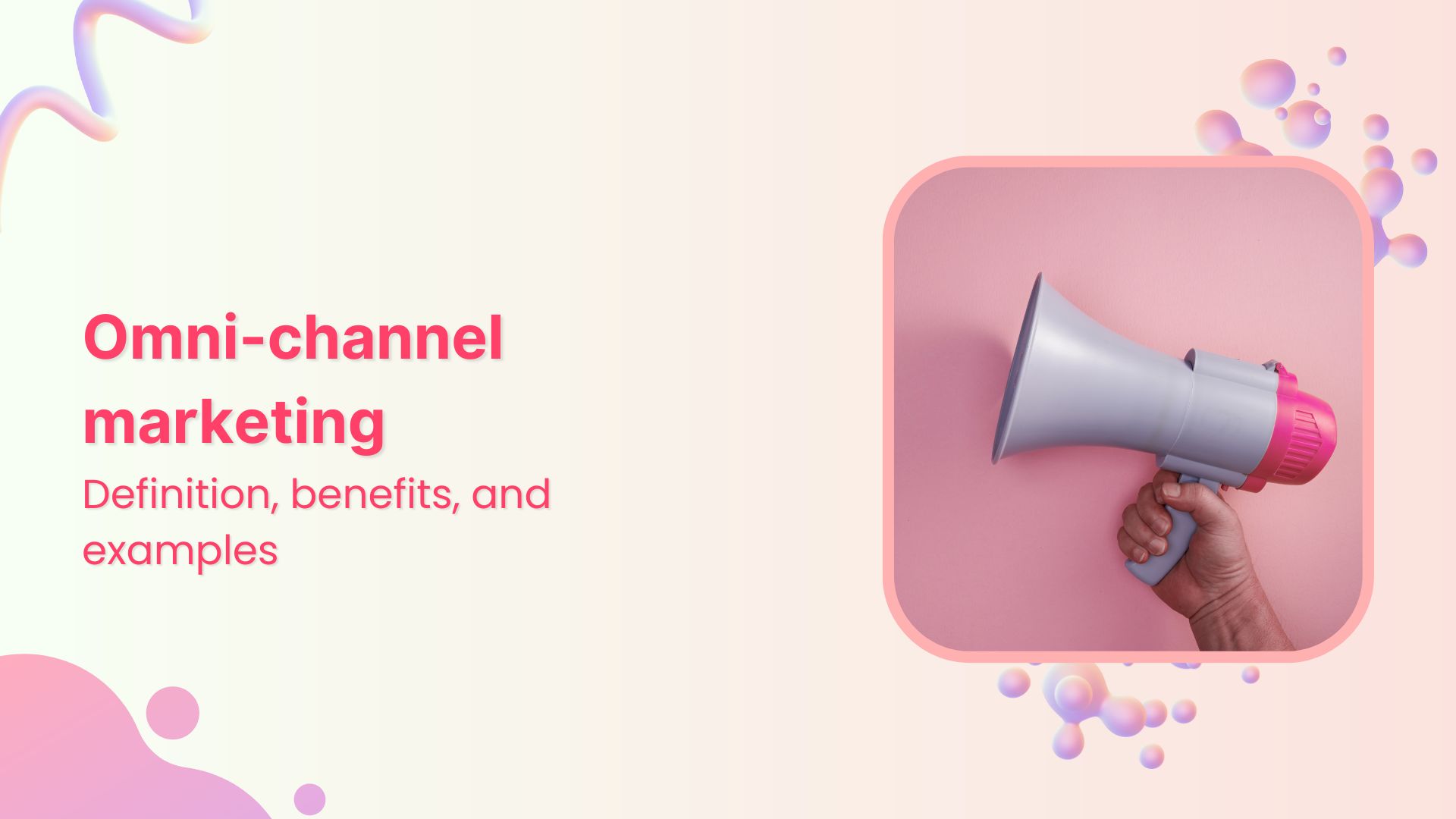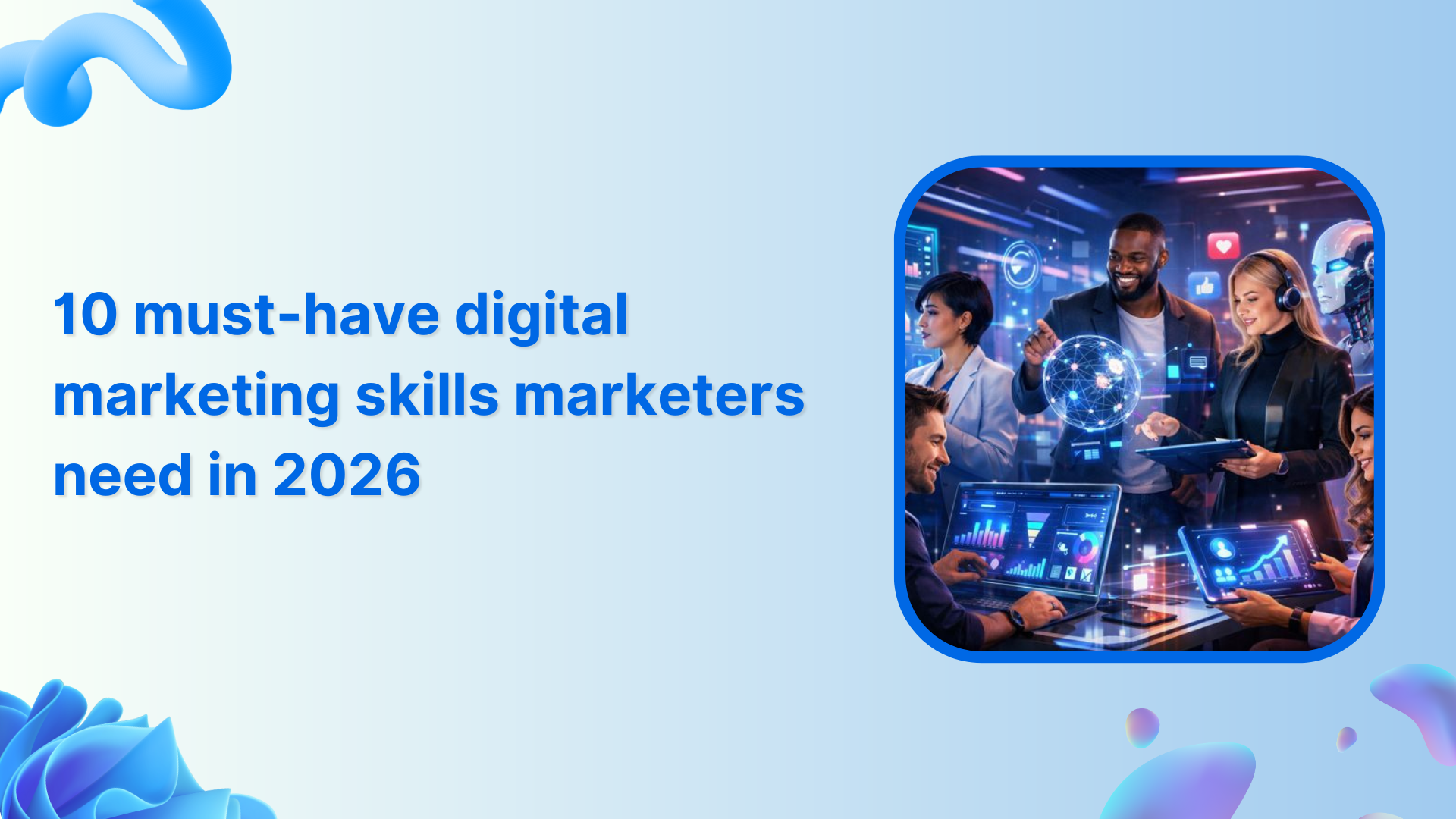Bulk-generate & schedule posts in seconds with Smart Scheduling. Try now!
How to use WhatsApp for marketing: Tips and best practices
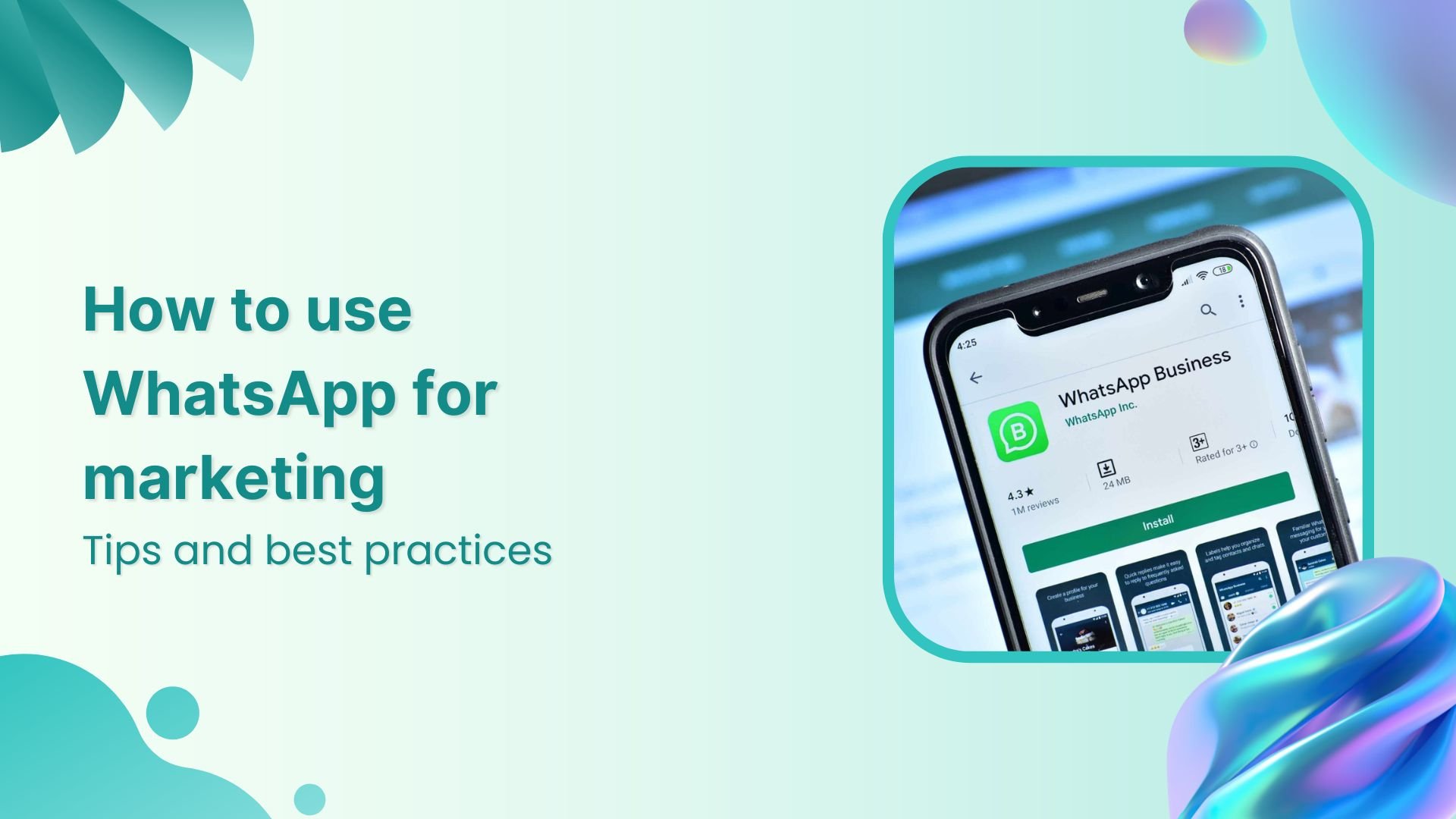
Businesses are always looking for new ways to connect with their audience, and learning how to use WhatsApp for marketing is a smart way to reach over 3 billion active users on the platform. WhatsApp has not gotten this massive user base overnight.
Instead, its evolution from a simple messaging app into a powerful marketing platform has happened over a long period of time.
The goal of this article is to discuss the various aspects of WhatsApp campaigns to help you engage customers directly, personally, and effectively. This comprehensive guide will walk you through everything you need to know about using WhatsApp for marketing, from setting up your business profile to executing successful WhatsApp campaigns that convert.
The easiest way to manage and grow your social channels.
Try ContentStudio for FREE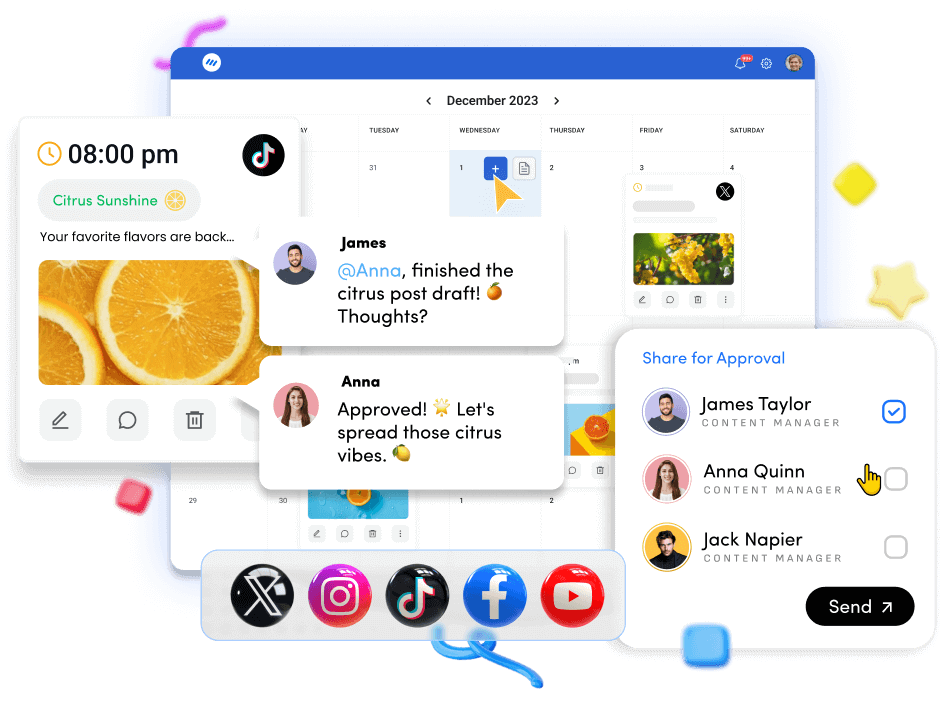
What is WhatsApp marketing?
WhatsApp marketing is the practice of using the WhatsApp messaging platform to promote your business, engage with customers, and build brand awareness. It involves using WhatsApp’s various features, including messaging, status updates, broadcast lists, and channels, to communicate marketing messages, provide customer support, and nurture relationships with your audience.
Unlike traditional marketing channels, WhatsApp marketing operates on a permission-based model where customers typically opt in to receive messages from your business, often during login, signup, or verification flows that use a whatsapp otp. This creates a more receptive audience and results in significantly higher open rates.
Benefits of WhatsApp marketing
The advantages of incorporating WhatsApp into your marketing strategy are substantial:
1. Exceptional engagement rates: WhatsApp boasts open rates of over 90%, with messages typically being read within minutes of delivery. This even surpasses email marketing and most other digital channels.
2. Direct and personal communication: WhatsApp enables one-on-one conversations that feel personal rather than promotional. Such permission marketing builds a direct line to customers, builds trust, and strengthens relationships.
3. Cost-effective solution: Compared to traditional advertising or SMS marketing, WhatsApp marketing requires minimal investment. The WhatsApp Business app is free, and even the WhatsApp Business API is relatively affordable.
4. Multimedia-rich content: Unlike SMS, WhatsApp supports images, videos, documents, voice messages, and even location sharing. This versatility allows you to create engaging, relatable content.
5. Global reach with a local feel: With users in over 180 countries, WhatsApp provides international reach while maintaining the intimate feel of a local conversation. This makes it perfect for businesses operating across multiple markets.
6. Instant customer support: The real-time nature of WhatsApp enables immediate customer service, allowing you to resolve issues quickly and enhance customer satisfaction.
7. Higher conversion rates: The personal nature of WhatsApp conversations and the trust users have in the platform translate to higher conversion rates compared to traditional marketing channels.
8. Valuable insights: WhatsApp Business provides metrics on message delivery, read receipts, and customer interactions, giving you data to refine your strategy and improve results over time.
How to use WhatsApp Business for marketing?
WhatsApp Business is specifically designed for small and medium-sized businesses to interact with customers. It offers enhanced features that go beyond the standard WhatsApp application, making it the foundation of any effective WhatsApp marketing strategy.
The app provides professional tools like business profiles, product catalogs, automated messages, and quick replies that streamline communication and enhance your brand’s credibility. For larger organizations with higher volume needs, the WhatsApp Business API offers even more advanced capabilities, including integration with CRM systems and chatbots.
Setting up WhatsApp Business for marketing
Before you start running campaigns or sending broadcasts, you need to set up WhatsApp Business the right way. This will help you build credibility, automate responses, and manage customer communication professionally.
Here’s a step-by-step guide to get started:
Step 1: Download and install the WhatsApp Business app from the Apple App Store or Google Play Store.
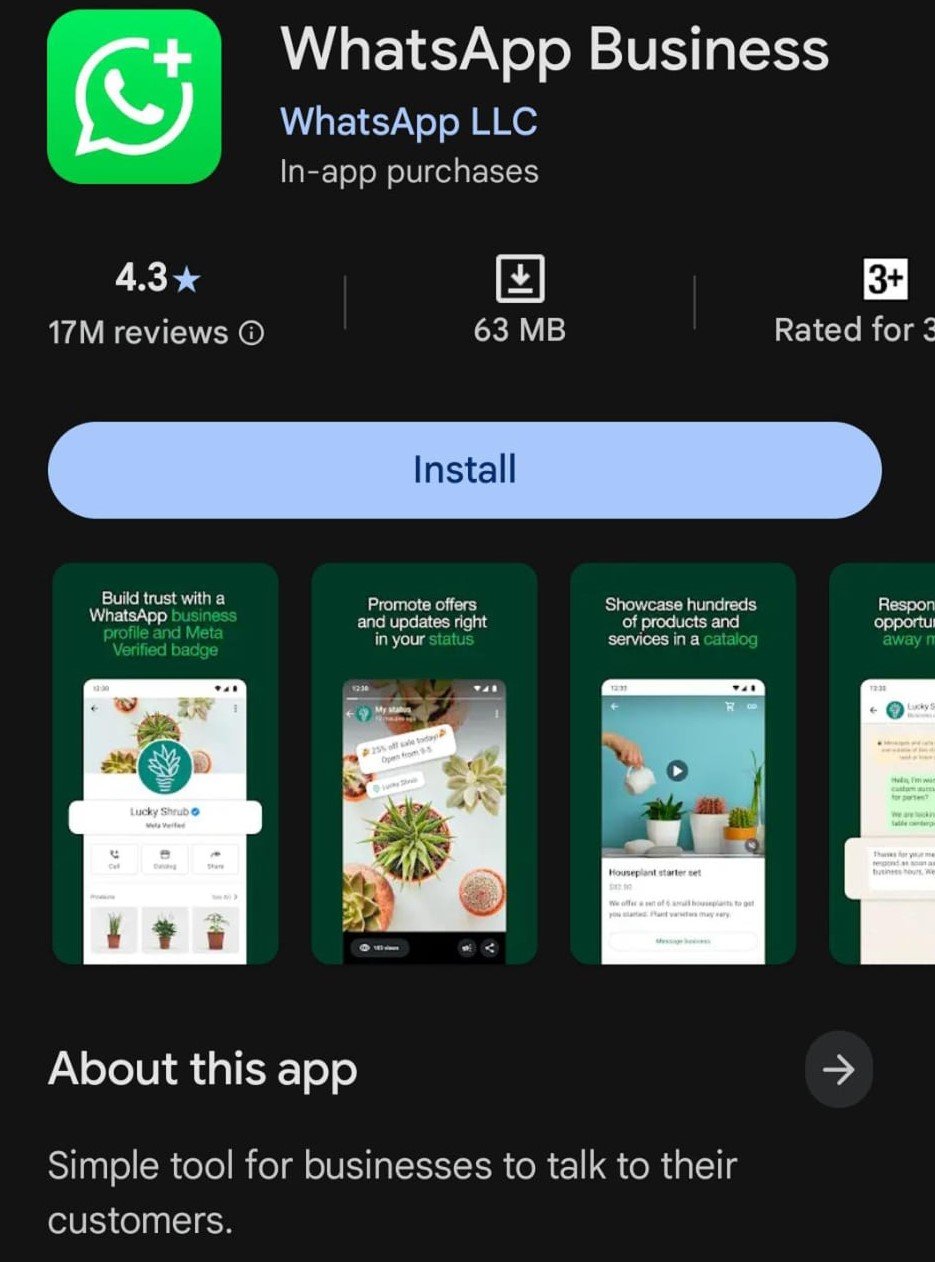
Step 2: Register your business number. It is recommended that you use a dedicated phone number for it and not your personal number. During setup, verify your number through SMS or a phone call.
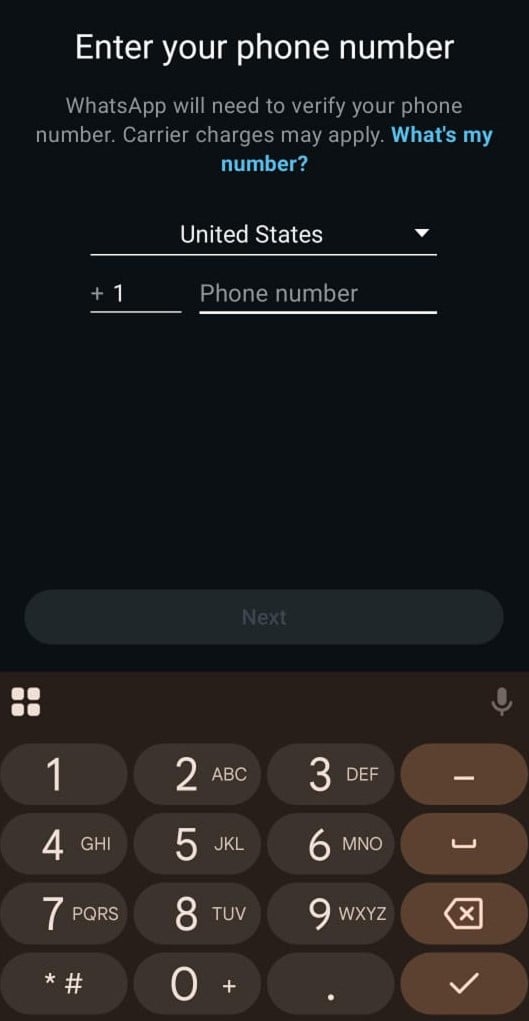
Step 3: Create a professional business profile by adding details like business name, logo, description, category, website, email address, and operating hours.
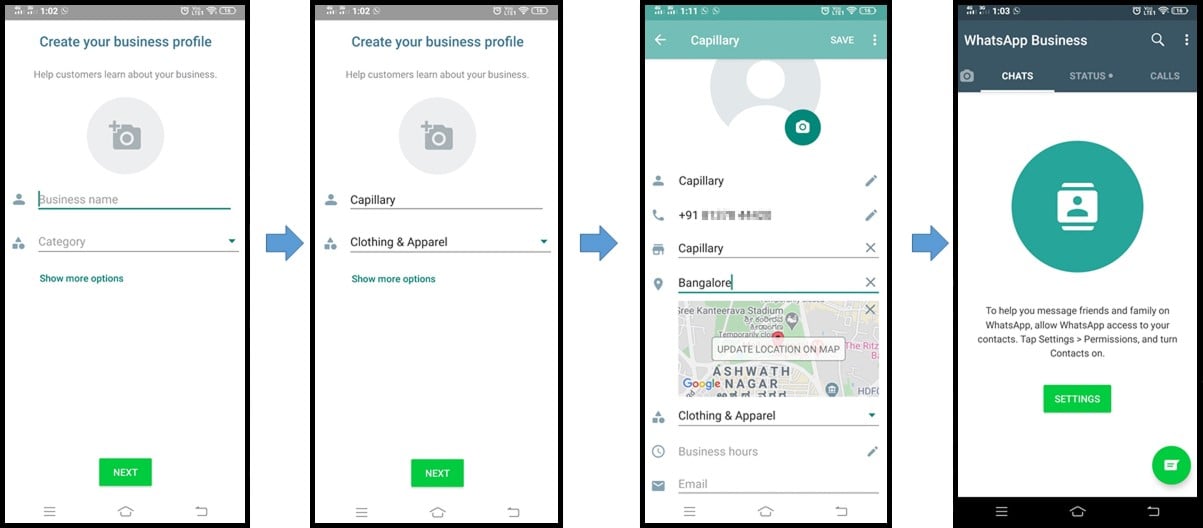
Step 4: Set up automated messages, including greetings, away messages, quick replies, etc. It will save your time and improve customer experience. Make sure you always get opt-in consent before messaging users.
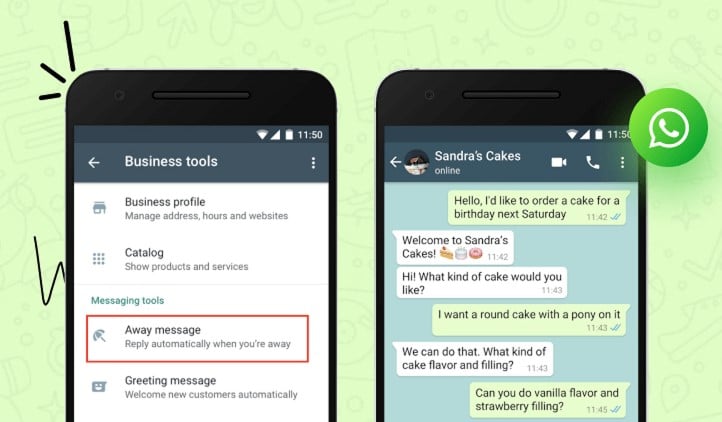
The above steps are the core of setting up an efficient WhatsApp Business profile. There are several additional things you can do to get even better results, such as:
- Use color-coded labels to organize conversations. This helps your team manage customer journeys and follow up easily.
- Create a catalog to display your products or services directly in WhatsApp. You can add images, prices, and short descriptions.
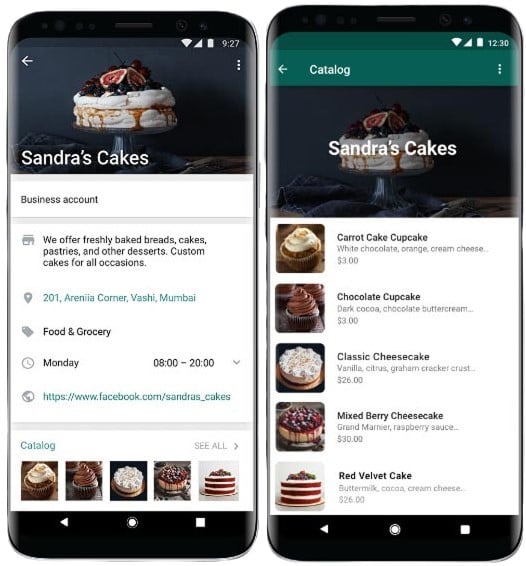
- If you’re managing a larger customer base or running marketing campaigns at scale, upgrade to the WhatsApp Business Platform (API).
- Avoid spammy broadcasts and keep your content relevant.
Once your WhatsApp Business setup is complete, you’ll be ready to launch personalized, engaging campaigns.
Building an effective WhatsApp marketing strategy
Learning how to use WhatsApp for marketing also involves knowing how to craft a marketing strategy through careful planning, clear objectives, and a deep understanding of your audience.
Unlike broadcast marketing channels, WhatsApp demands a more thoughtful, relationship-focused approach that prioritizes value delivery over aggressive marketing.
Consider these key elements when developing your WhatsApp marketing strategy:
- Define clear objectives: Are you looking to increase sales, improve customer service, build brand awareness, or gather feedback? Your goals will shape your content, frequency, and approach.
- Understand your audience: Who are your WhatsApp subscribers? What value are they seeking? What problems can you solve for them?
- Establish guidelines and tone: Determine how your brand should sound on WhatsApp. Should you be formal or casual? Friendly or professional?
- Plan your content mix: Balance promotional messages with educational content, customer support, and exclusive perks.
- Determine optimal frequency: Too many messages and you risk annoying subscribers; too few and they forget about you. Test different frequencies to find your sweet spot, but generally, 2-4 messages per week is a good starting point.
- Create a content calendar: Plan your WhatsApp campaigns in advance, aligning them with your overall marketing strategy, product launches, and seasonal opportunities.
- Set up measurement metrics: Track delivery rates, read rates, response rates, conversion rates, and opt-out rates to gauge effectiveness and refine your approach.
How to grow your WhatsApp audience
Building a quality WhatsApp audience is essential for successful marketing through WhatsApp. Unlike email lists that can be purchased (which is never recommended for WhatsApp), your WhatsApp contacts must opt in willingly to create a more engaged and receptive audience.
Here are some tried-and-tested ways to grow your WhatsApp audience:
Promote your WhatsApp number across channels
Share your WhatsApp contact everywhere your audience might see it. Add it to your website, email signatures, social media profiles, business cards, and physical locations. Create a clickable WhatsApp link (wa.me/yourphonenumber) that makes it easy for people to start a conversation with one tap.
Offer exclusive incentives
Give people a compelling reason to connect with you on WhatsApp. Offer exclusive discounts, early access to sales, special content, or VIP customer service to WhatsApp subscribers. Make them feel like insiders who get perks others don’t.
Use click-to-WhatsApp ads
Platforms like Facebook and Instagram offer click-to-WhatsApp ad formats that allow users to initiate a conversation directly from an advertisement. These ads are highly effective for growing your audience with interested prospects.
Add WhatsApp to your website
Integrate a WhatsApp chat widget on your website that invites visitors to connect with you. Place it strategically on high-traffic pages, product pages, and checkout pages where customers might need assistance.
Use QR codes
WhatsApp generates a unique QR code for your business that people can scan to instantly start a conversation. Alternatively, many marketers use tools like WhatsApp QR Code Generator to create customized WhatsApp QR codes for packaging, receipts, flyers, posters, and other physical marketing materials.
Cross-promote on other platforms
Use your existing social media following, email list, and other channels to encourage people to join your WhatsApp community. Explain the unique benefits they’ll receive by connecting on WhatsApp.
Also read: 200+ creative ways to say “follow us on social media”
Encourage word-of-mouth
Provide such exceptional value through WhatsApp that your current subscribers naturally share your contact with friends and family. Consider creating shareable content or referral incentives that reward subscribers for spreading the word.
Make joining effortless
Remove any friction from the opt-in process. Don’t require lengthy forms or complicated steps. The easier you make it to connect with you on WhatsApp, the more people will do it.
10+ Whatsapp marketing ideas
Creative WhatsApp campaigns can set your brand apart and create memorable experiences for your customers. The following table provides innovative ideas to inspire your marketing through WhatsApp:
1. Flash sales and limited-time offers
Create urgency by announcing exclusive, time-sensitive deals to your WhatsApp subscribers.
Key benefits: Drives quick action and immediate conversions through the immediacy of WhatsApp.
2. Behind-the-scenes content
Share exclusive glimpses into your business operations, product development, or team culture.
Key benefits: Builds connection and makes customers feel like valued insiders.
3. Product teasers and launches
Build anticipation for new products by sharing sneak peeks, countdown messages, and early access opportunities.
Key benefits: Creates excitement and rewards WhatsApp subscribers with exclusive first access.
4. Personalized recommendations
Use customer data and conversation history to send tailored product suggestions.
Key benefits: Increases relevance and conversion by matching individual preferences and purchase history.
5. Interactive polls and surveys
Engage your audience by asking for their opinions on new products, features, or business decisions.
Key benefits: Makes customers feel valued while providing valuable business insights.
6. Contest and giveaways
Run WhatsApp-exclusive contests that encourage engagement and sharing.
Key benefits: Boosts engagement and generates user-generated content featuring your brand.
7. Educational content series
Create a series of tips, tutorials, or industry insights delivered over time.
Key benefits: Positions your brand as an expert while providing genuine ongoing value.
8. Order updates and notifications
Keep customers informed about their purchase journey with shipping updates and delivery confirmations.
Key benefits: Reduces support inquiries and increases customer satisfaction through proactive communication.
9. Birthday and anniversary messages
Collect customer dates and send personalized wishes along with special offers.
Key benefits: Strengthens emotional connections through thoughtful, personalized gestures.
10. Quick customer service
Use WhatsApp as a responsive support channel for quick issue resolution and assistance.
Key benefits: Builds loyalty through excellent, immediate service and personal attention.
11. Story sharing
Encourage customers to share their experiences, reviews, or user-generated content.
Key benefits: Builds community and provides authentic social proof for your brand.
12. Loyalty program updates
Keep members informed about their points, rewards, exclusive perks, and special opportunities.
Key benefits: Maintains engagement with loyal customers and encourages repeat purchases.
Writing effective WhatsApp marketing messages
The quality of your messages has a direct impact on whether subscribers value your presence in their WhatsApp or view you as spam. Crafting effective messages requires understanding the platform’s intimate nature and respecting your audience’s time and attention.
Here are the key things to consider while writing effective WhatsApp marketing messages:
- Keep the message concise and clear, as WhatsApp is meant for quick communication.
- Personalize by using the customer’s name and referencing previous interactions.
- Make sure your message provides some value to the recipient.
- Use conversational language and be authentic while maintaining professionalism appropriate to your brand.
- Add multimedia strategically to enhance the content, but don’t overuse it.
- Include a clear call-to-action.
- Send the messages at appropriate times.
- Use emojis thoughtfully.
- Create urgency for time-sensitive offers and communicate the deadlines clearly.
- Always provide an opt-out option to the recipients.
How to use WhatsApp Status for marketing?
WhatsApp Status is a feature that allows you to share photos, videos, GIFs, music, and text updates that disappear after 24 hours. It is similar to Instagram and Facebook Stories.
Status updates appear in a dedicated tab within WhatsApp, and only your contacts can view them. This makes Status perfect for sharing timely content, promotions, and behind-the-scenes glimpses that don’t require the permanence of a direct message.
Best practices for WhatsApp Status marketing
- Post consistently: Regular Status updates keep your business top-of-mind. Aim for at least one update daily, but avoid overwhelming your audience with too many updates at once.
- Mix content types: Alternate between promotional content, educational posts, behind-the-scenes glimpses, customer testimonials, and engaging questions to keep your Status feed diverse and interesting.
- Use eye-catching visuals: Since Status content is visual-first, invest in high-quality images and videos that grab attention immediately. Use bold text overlays, your brand colors, and clear messaging.
- Create urgency: Take advantage of the 24-hour disappearance to create time-sensitive offers, flash sales, or limited-availability promotions that encourage immediate action.
- Include clear CTAs: Add text overlays with clear instructions like “Swipe up to shop,” “DM us to order,” or “Save this offer before it expires.” Make the next step obvious.
- Show your human side: Share team moments, customer interactions, or day-in-the-life content that humanizes your brand and builds connection.
- Announce new products or services: Use Status to tease upcoming launches, reveal new arrivals, or provide early access to WhatsApp contacts, making them feel like VIPs.
- Share user-generated content: Repost customer photos, reviews, or testimonials (with permission) to build social proof and community.
- Maintain brand consistency: While Status is more casual, ensure your visual style, tone, and messaging remain consistent with your overall brand identity.
- Track engagement: Monitor who views your Status updates to understand what content resonates and adjust your strategy accordingly.
The following example shows how a brand is promoting its products via WhatsApp status:
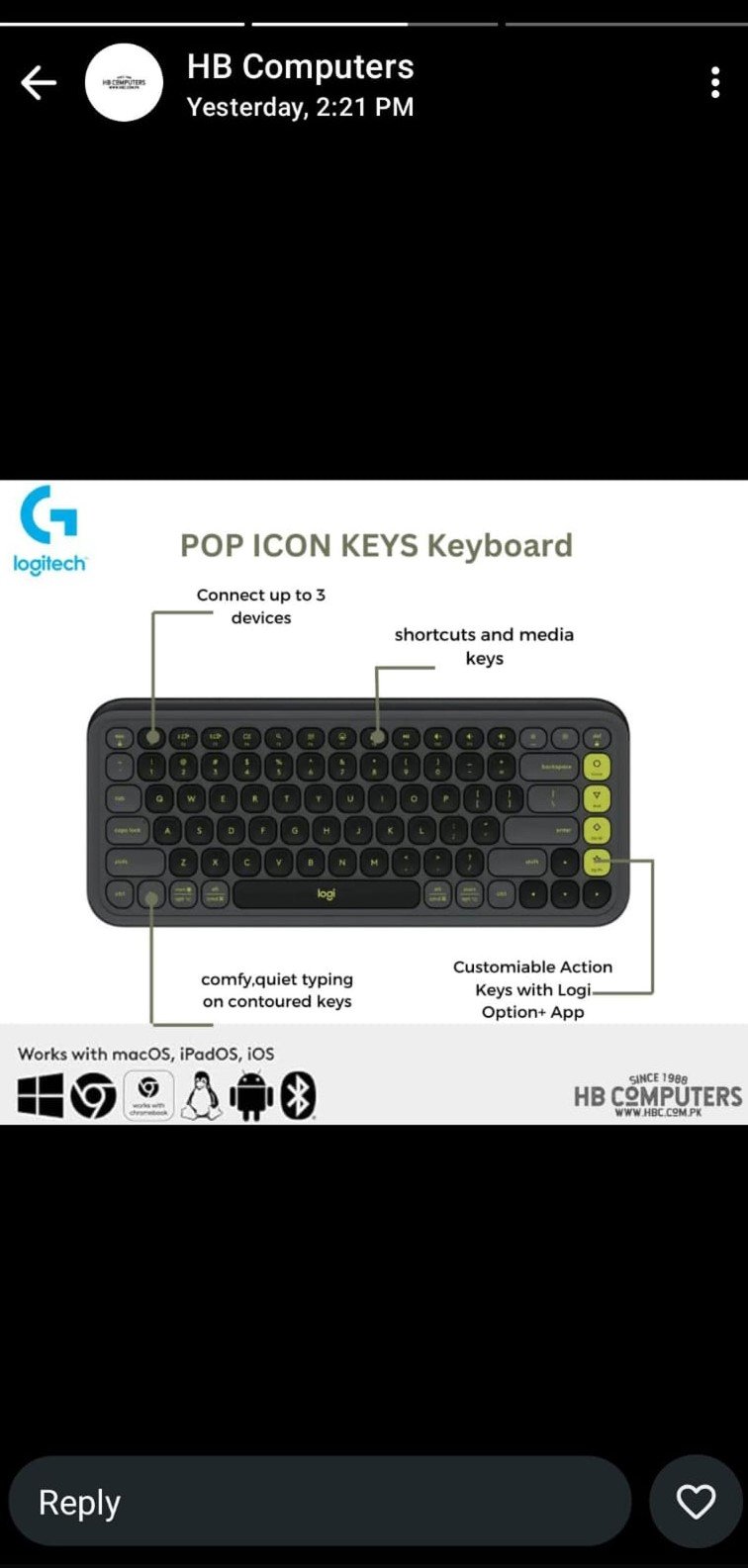
How to use WhatsApp Broadcast for marketing?
WhatsApp Broadcast Lists allow you to send messages to multiple contacts simultaneously while maintaining the privacy and personal feel of individual conversations. When you send a broadcast message, it appears in each recipient’s chat as if you sent it directly to them, without revealing that others received the same message.
This feature is particularly valuable for WhatsApp campaigns because it combines the efficiency of mass messaging with the intimacy of one-on-one communication.
However, there’s an important limitation: broadcast messages are only delivered to contacts who have saved your business number in their phone.
How to create and use broadcast lists?
In WhatsApp Business, go to “Broadcast Lists” and create a new list. Add contacts who have opted in to receive your messages and who have your number saved. You can add up to 256 contacts per broadcast list.
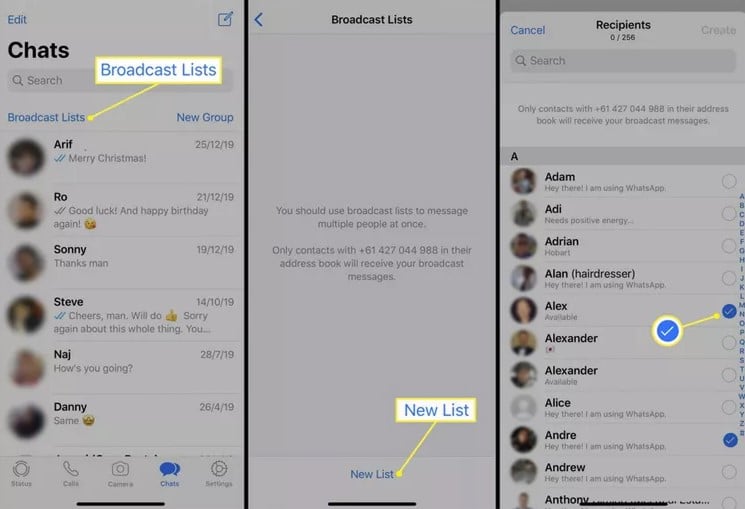
Best practices for using WhatsApp Broadcast for marketing
To get the maximum benefits of marketing via WhatsApp Broadcast, you should:
- Segment your audience in terms of past customers, leads, VIP clients, or customers interested in specific products.
- Use broadcasts for important announcements, exclusive offers, product launches, or time-sensitive information
- Personalize at scale and use language that speaks directly to each recipient.
- Track which messages get delivered and read to understand your audience’s engagement and refine your content strategy.
How to use WhatsApp Channel for marketing?
WhatsApp Channels is a newer feature that allows businesses and organizations to broadcast updates to an unlimited number of followers in a one-way communication format. Unlike broadcast lists, Channels don’t require followers to save your number, and they can accommodate an unlimited audience size, making them ideal for larger-scale marketing efforts.
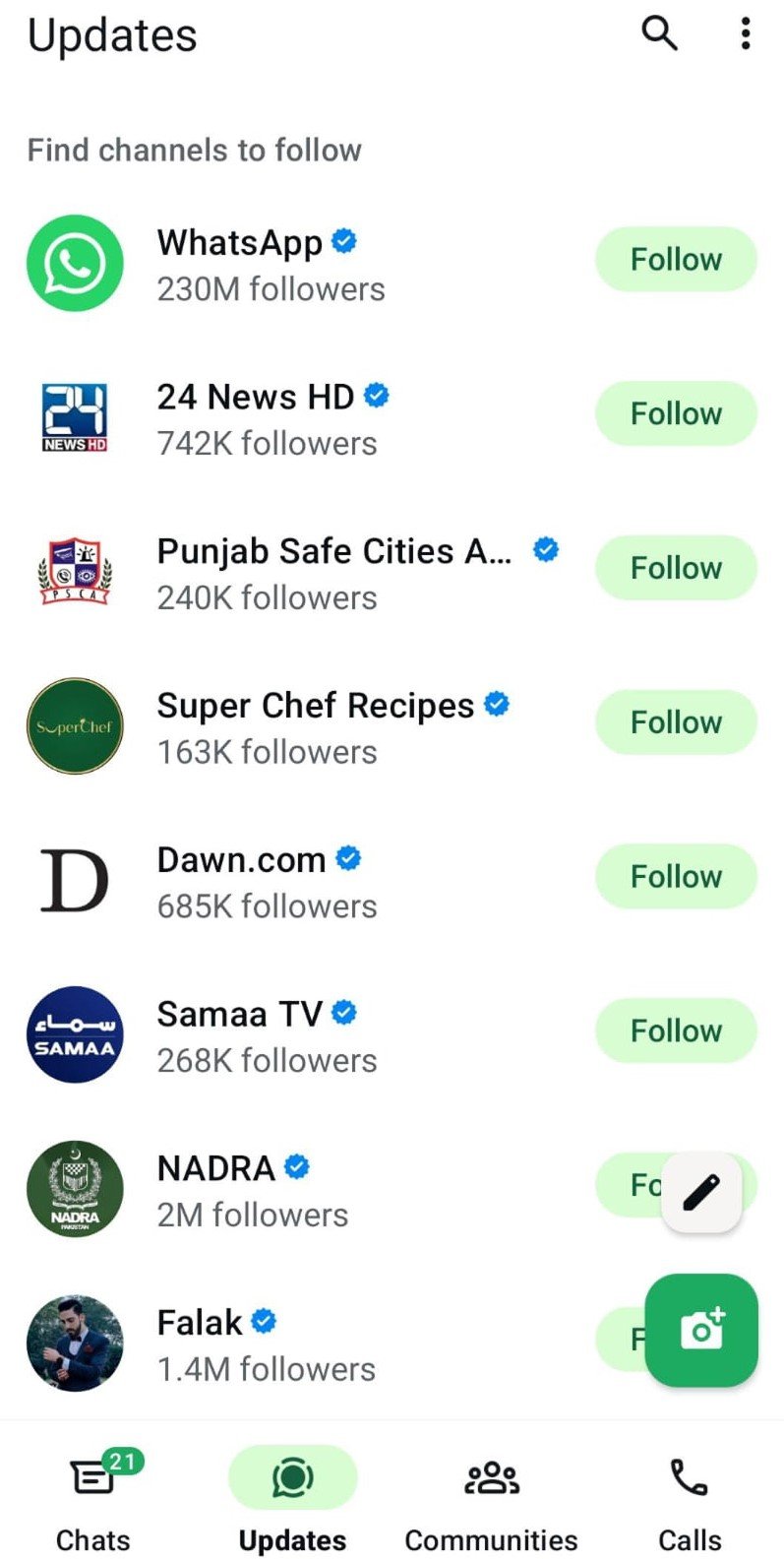
Channels appear in a separate “Updates” tab within WhatsApp, keeping broadcast content distinct from personal conversations. Followers can react to updates with emojis and forward them, but they cannot reply directly, which keeps your primary inbox manageable while still allowing for large-scale reach.
Setting up your WhatsApp Channel
To create a Channel, you’ll need the latest version of WhatsApp. Navigate to the Updates tab, tap the plus icon, and follow the prompts to create your Channel. You can customize your Channel name, description, and icon to reflect your brand identity.
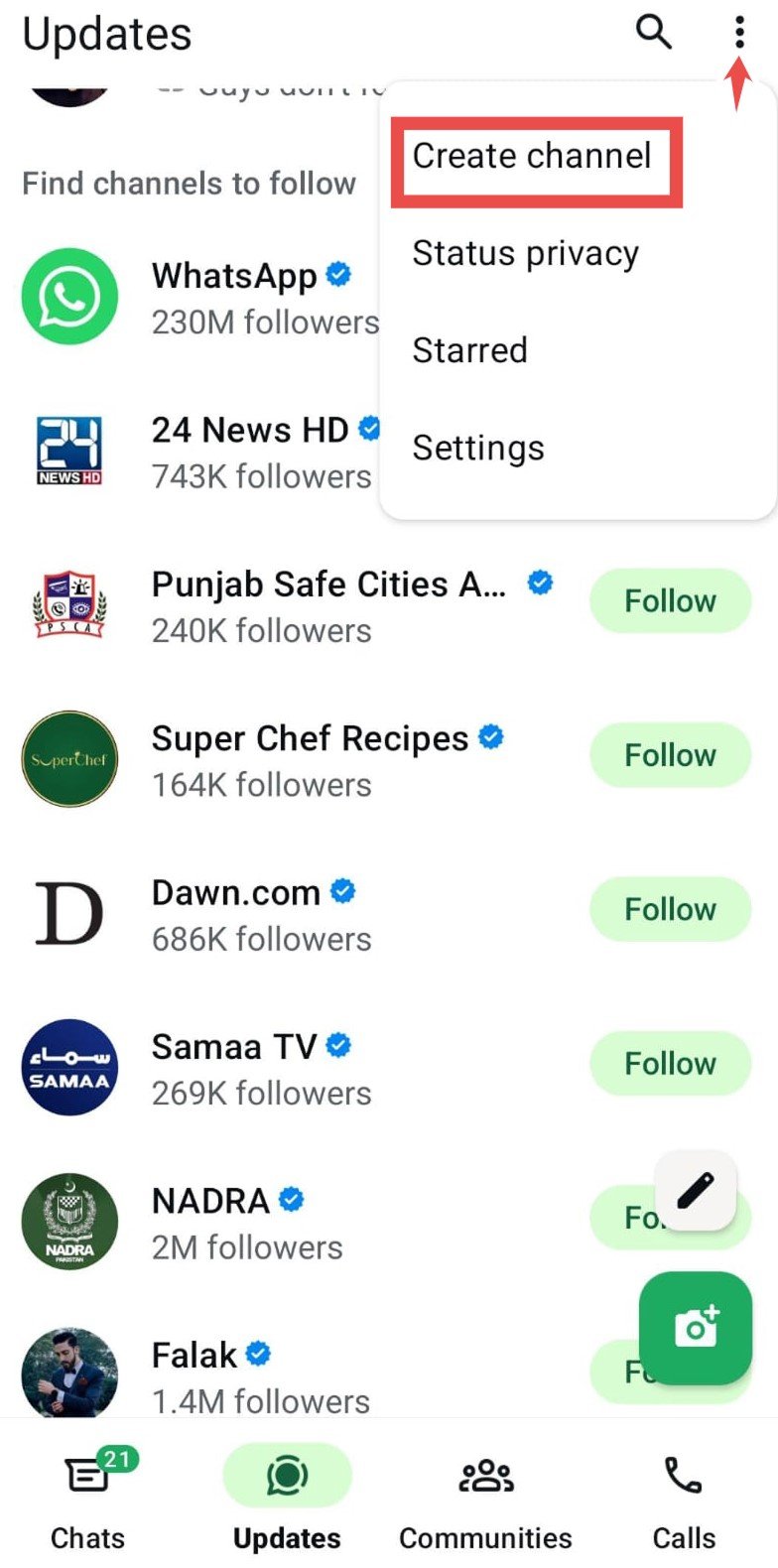
Best practices for WhatsApp Channel marketing
Maximize the benefits of WhatsApp Channel marketing by following these best practices:
- Promote your Channel across all marketing touchpoints to build a large following.
- Regular updates keep followers engaged and ensure they think of your brand regularly.
- Make your Channel worth following by offering content unavailable elsewhere.
- Channels support photos, videos, stickers, and polls. Take full advantage of these formats to create engaging, visually compelling content.
- Post customer testimonials, reviews, case studies, and success stories.
- Offer special discounts or deals exclusively to Channel followers to reward their subscription.
- Create content valuable enough that followers naturally want to share it with their contacts.
- If eligible, get your Channel verified to add credibility and help followers trust.
Running a successful WhatsApp marketing campaign
A WhatsApp marketing campaign is a coordinated series of messages designed to achieve a specific business objective. Unlike individual messages, campaigns are strategic initiatives with clear goals, defined timelines, and measurable outcomes.
Successful WhatsApp campaigns use the platform’s high engagement rates and personal nature to create meaningful interactions that drive results. They require careful planning, compelling content, and proper execution to maximize impact while respecting subscribers’ attention and trust.
The critical elements of a successful WhatsApp marketing campaign are:
- Clear campaign objective
- Defined target audience
- Compelling campaign theme
- Value-driven content
- Strong calls-to-action
- Optimal message timing
- Performance tracking
- Follow-up strategy
WhatsApp marketing campaign examples
Let’s look at some examples of successful WhatsApp marketing campaigns:
1. S-Bahn Munich – Selfie competition
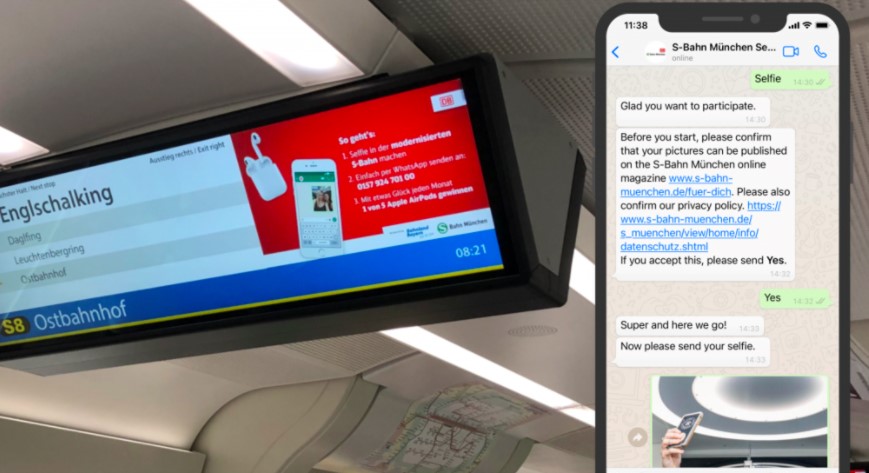
To promote its newly modernized trains, S-Bahn Munich turned to WhatsApp instead of traditional advertising. Commuters were invited to take a selfie inside the revamped trains and send it via WhatsApp with the keyword “selfie.” Each submission entered a lucky draw, and the best photos were featured in S-Bahn’s online magazine.
Result: In just 3.5 weeks, the campaign collected over 250 selfies, generated buzz across social media and news outlets, and successfully reintroduced the brand’s modern image using WhatsApp’s interactive features and chatbot automation.
2. Unilever – “I’ll bring you back your beloved clothes”
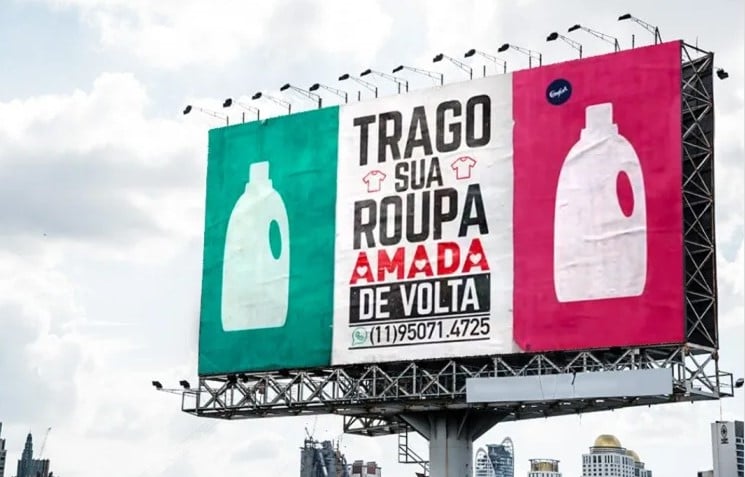
To launch its new fabric softener, Comfort, in Brazil, Unilever used WhatsApp in a highly creative way. Billboards across São Paulo displayed a WhatsApp number promising to “bring back your beloved clothes.”
When users messaged the number, an AI-powered chatbot named MadameBot shared clothing care tips, product recommendations, and exclusive discount codes for online purchases.
Result: The campaign drove 290,000 messages from 12,000 unique users, boosted sales by 14x, and showcased how chatbots and WhatsApp automation can deliver personalized, high-impact marketing at scale.
Several other WhatsApp marketing examples are discussed throughout this article in the form of images, along with practical tips and strategies.
Tips for successful WhatsApp marketing campaigns
Follow these tips to run a successful WhatsApp marketing campaign:
1. Get explicit permission
Only message people who have opted in to receive communications from you. Permission-based marketing is not just ethical but effective because your audience is already interested.
2. Segment thoughtfully
Don’t send every message to every contact. Segment based on interests, purchase history, engagement level, and other relevant factors to ensure relevance.
3. Test before launching
Send test messages to yourself and team members to check formatting, links, images, and overall impact before sending to your entire list.
4. Start strong
Your opening message sets the tone for the entire campaign. Make it compelling, valuable, and engaging from the first word.
5. Space messages appropriately
Don’t bombard recipients with too many messages too quickly. Generally, space campaign messages at least several hours apart, and avoid sending multiple messages on the same day unless it’s truly time-sensitive.
6. Provide value in every message
Each message should offer something valuable—whether it’s information, entertainment, exclusive access, or a special offer. Never send a message without a clear value proposition.
7. Make opting out easy
Always include simple opt-out language and honor unsubscribe requests immediately. Respecting people’s preferences protects your brand reputation.
8. Respond promptly to replies
Campaigns often generate questions and responses. Be prepared to engage in personal conversations that arise from your broadcast messages.
9. Use multimedia strategically
Images and videos increase engagement, but ensure they’re high-quality, load quickly, and add genuine value to your message.
10. Create urgency authentically
Time-limited offers work well on WhatsApp, but the urgency must be genuine. Don’t manufacture fake scarcity—it damages trust.
11. Maintain brand consistency
Your WhatsApp campaigns should align with your overall brand voice, values, and marketing strategy. Consistency builds recognition and trust.
12. Analyze and iterate
Review campaign performance metrics and learn from what worked and what didn’t. Apply these insights to improve future campaigns.
13. Consider message length
While WhatsApp allows longer messages, concise content typically performs better. If you have a lot to say, consider breaking it into multiple messages or directing it to a landing page.
14. Follow up appropriately
After a campaign concludes, acknowledge participation, share results if appropriate, and maintain the relationship rather than going silent until the next campaign.
How to use WhatsApp for affiliate marketing?
Affiliate marketing through WhatsApp offers unique advantages, such as direct communication with potential buyers, the ability to answer questions in real time, and a more personal approach to recommendations.
WhatsApp’s high engagement rates and intimate nature make it an excellent channel for affiliates to promote products and services while building trust with their audience.
Here’s how:
1. Build a targeted, engaged audience
Focus on attracting contacts genuinely interested in your niche by sharing your WhatsApp contact across your content platforms, social media profiles, and communities. Offer exclusive incentives like special discount codes, early product recommendations, or valuable insider tips that make joining your WhatsApp list worthwhile.
2. Provide value-first content
Establish yourself as a trusted advisor before promoting products. Share helpful tips, industry insights, and honest product reviews that include both pros and cons. When you do recommend affiliate products, explain why they’re valuable and how they solve specific problems, and share your personal experience to build credibility.
3. Utilize WhatsApp features strategically
Use Status updates for product showcases and limited-time offers, broadcast lists for targeted promotions to segmented audiences, and one-on-one conversations to answer questions personally. Create exclusive discount codes for your WhatsApp subscribers that make them feel special while tracking your conversion rates.
4. Maintain transparency and balance
Always disclose your affiliate relationships upfront—it’s both legally required and builds trust. Balance promotional content with valuable non-sales information, avoiding overwhelming your audience with constant pitches. Follow up with customers post-purchase to ensure satisfaction, reinforcing your role as a trusted advisor rather than just a promoter.
How to use WhatsApp for business marketing
Using WhatsApp for business marketing extends beyond simple promotional messaging. It’s about creating a comprehensive communication strategy that enhances every aspect of your customer relationship. For businesses of all sizes, WhatsApp can transform how you connect with customers, deliver service, and drive growth through direct, personal interactions.
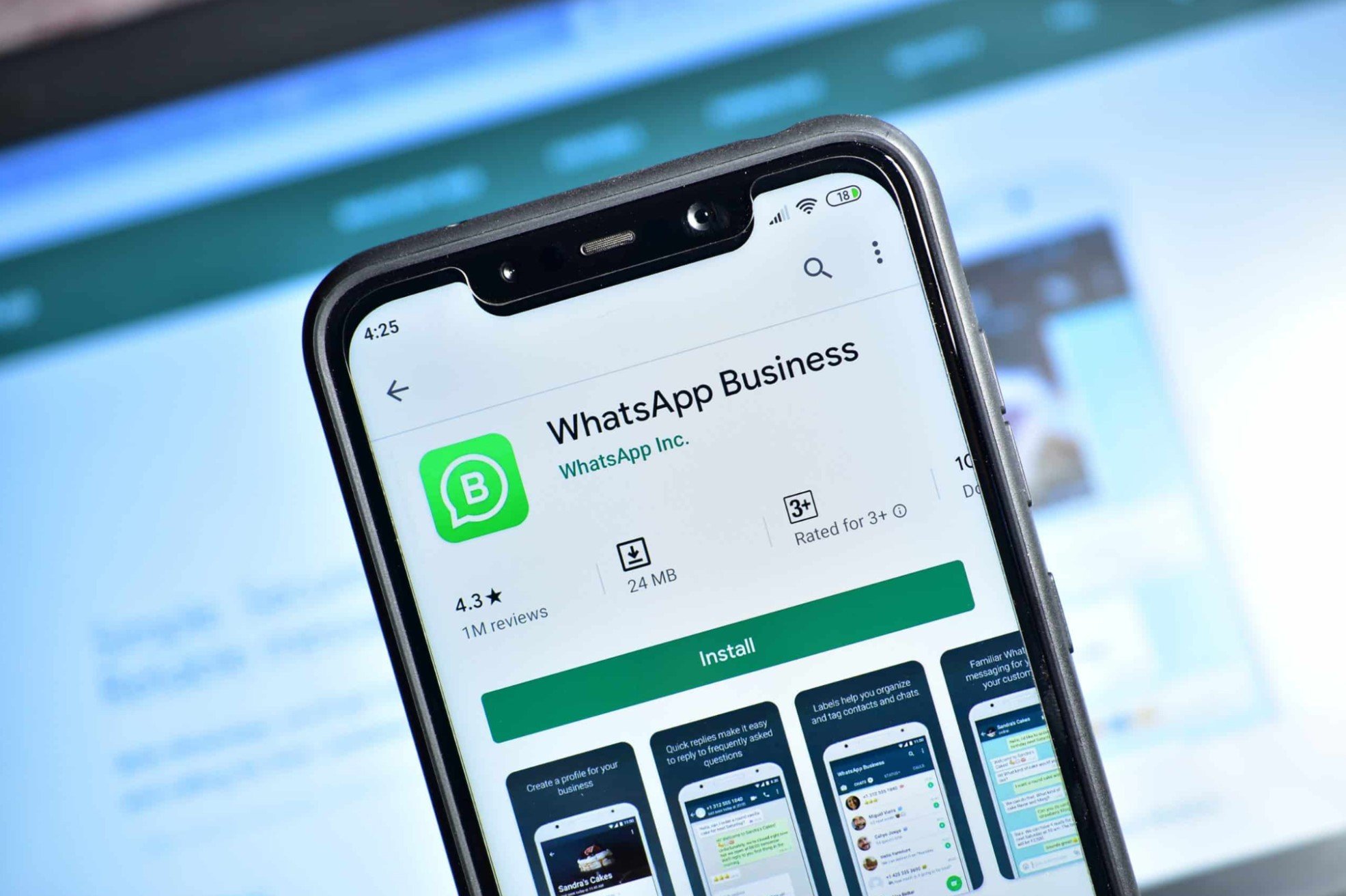
Here are the areas where you can use WhatsApp for business marketing:
1. Customer acquisition and sales: Use WhatsApp for dynamic sales discussions where you can share product catalogs, send personalized recommendations, answer questions in real-time, provide quotes, and even complete transactions.
2. Onboarding and relationship nurturing: Welcome new customers with automated greeting messages, share getting-started guides and tutorial videos, and remain accessible for setup questions.
3. Customer support and order management: Provide responsive, personal customer service that allows quick problem resolution while maintaining message history for context. Keep customers informed throughout their purchase journey.
4. Community building and loyalty: Create exclusive WhatsApp Groups for VIP customers, brand ambassadors, or loyal fans to foster deeper connections and generate word-of-mouth marketing.
How to use WhatsApp for network marketing
Network marketing (also known as multi-level marketing) relies heavily on personal relationships and direct communication. It makes WhatsApp an ideal platform for distributors and representatives. The app’s personal nature aligns perfectly with network marketing’s relationship-focused approach, allowing for authentic conversations that build trust and drive results.
The following are the core WhatsApp strategies for network marketing success:
1. Prospecting, recruitment, and opportunity presentation: Connect with potential recruits through personal WhatsApp conversations where you can share your story and answer questions in real time.
2. Team building and training: Create WhatsApp Groups where your downline can share experiences, ask questions, celebrate wins, and support each other, which helps in creating a community that increases retention and motivation.
3. Product promotion and customer management: Share detailed product information, usage instructions, testimonials, and before-and-after photos with both customers and team members. Make ordering easy by sharing your catalog through WhatsApp.
4. Motivation and compliance: Keep your team motivated with encouraging messages, recognition of achievements, and success story sharing that inspires continued effort. Always ensure your WhatsApp marketing complies with your company’s policies.
Top 5 WhatsApp marketing tools
While WhatsApp Business provides robust built-in features, third-party tools can enhance and scale your marketing efforts, particularly as your business grows. Once you have mastered how to use WhatsApp for marketing, you should consider using these tools, as they offer advanced automation, analytics, multi-user access, CRM integration, and other capabilities that take your WhatsApp marketing to the next level.
1. Meta’s Official WhatsApp Business Platform
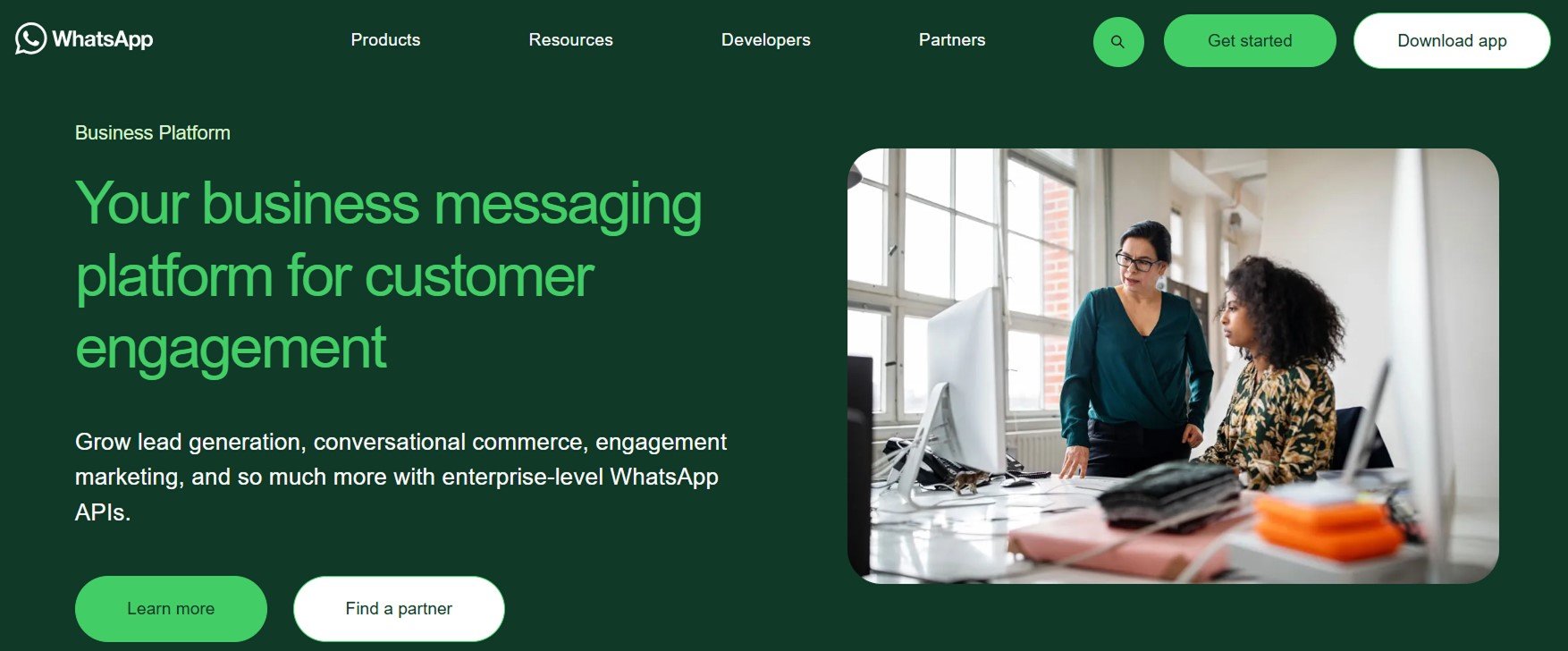
Let’s start with the foundation, Meta’s official WhatsApp Business Platform. This is the enterprise-grade solution that lets businesses manage large-scale conversations, send notifications, and automate replies using approved message templates. It’s perfect for brands that want verified business profiles, multiple user access, and complete control over communication.
2. WATI
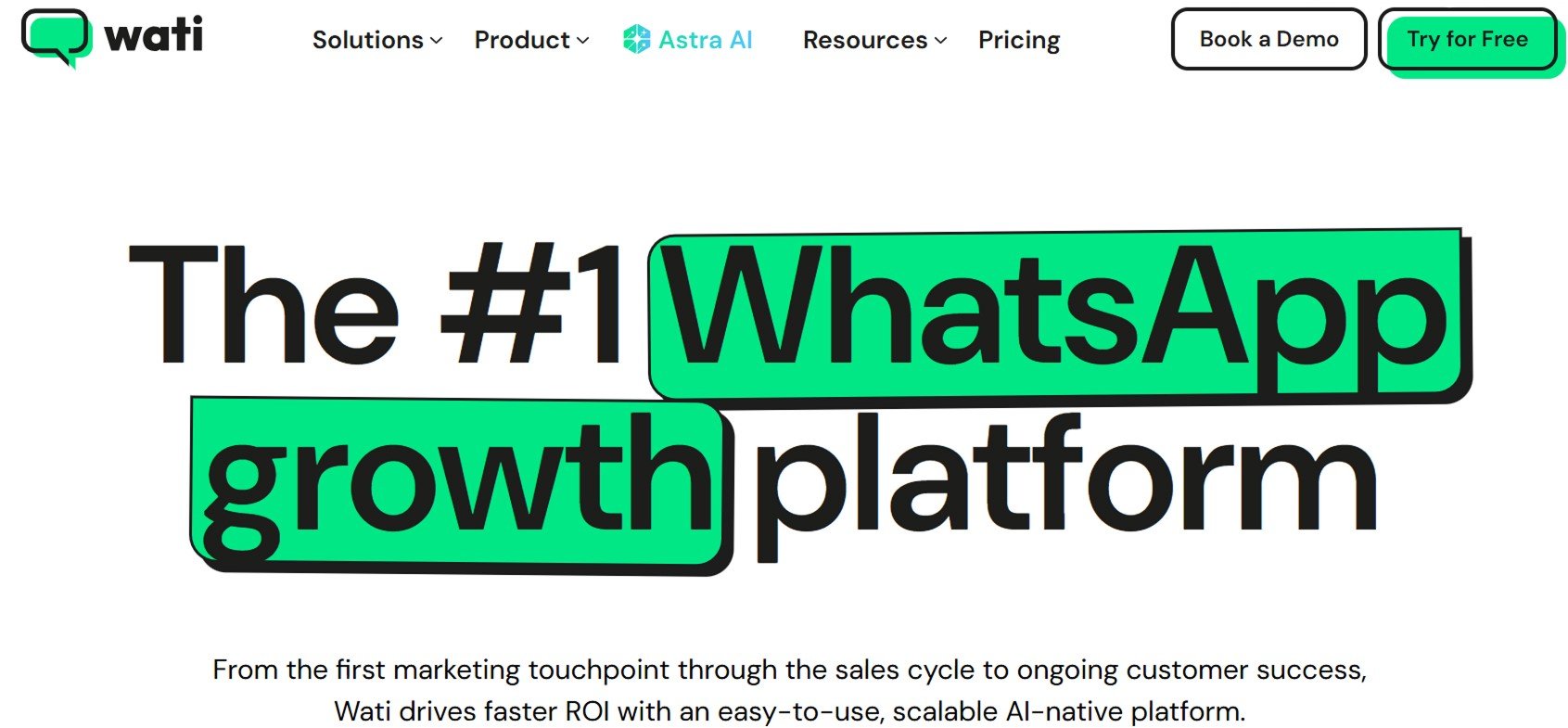
WATI is a user-friendly WhatsApp marketing tool that connects directly with the official API. It’s designed for small and medium businesses that want automation without the tech headache. You can build chatbots, send broadcast messages, manage contacts, and even track engagement from a clean, simple dashboard.
3. Zoko
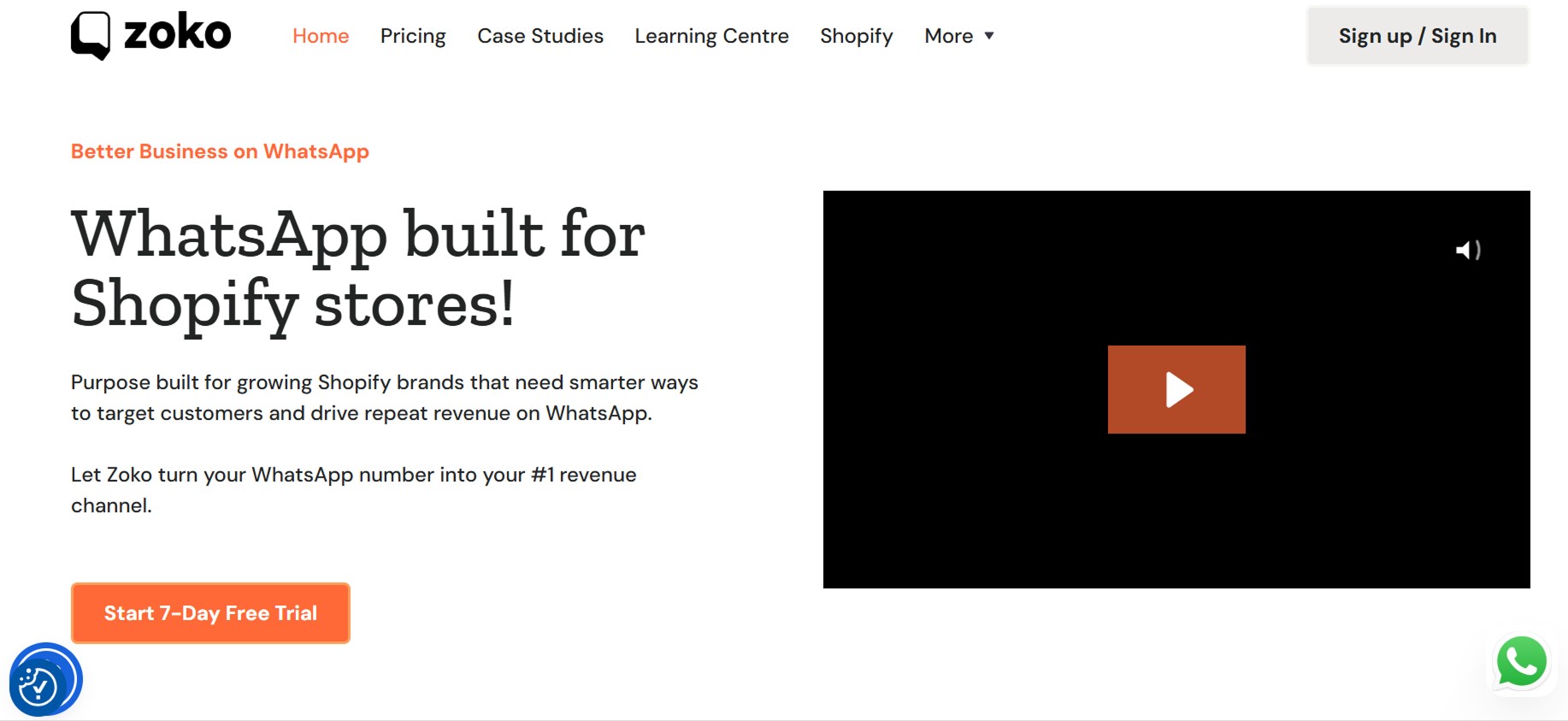
If you’re running an eCommerce business, Zoko is a powerhouse. It allows you to manage customer chats, send order confirmations, recover abandoned carts, and even let customers browse your product catalog directly on WhatsApp. Marketers love this WhatsApp marketing tool, as it turns WhatsApp into a sales channel.
4. Brevo
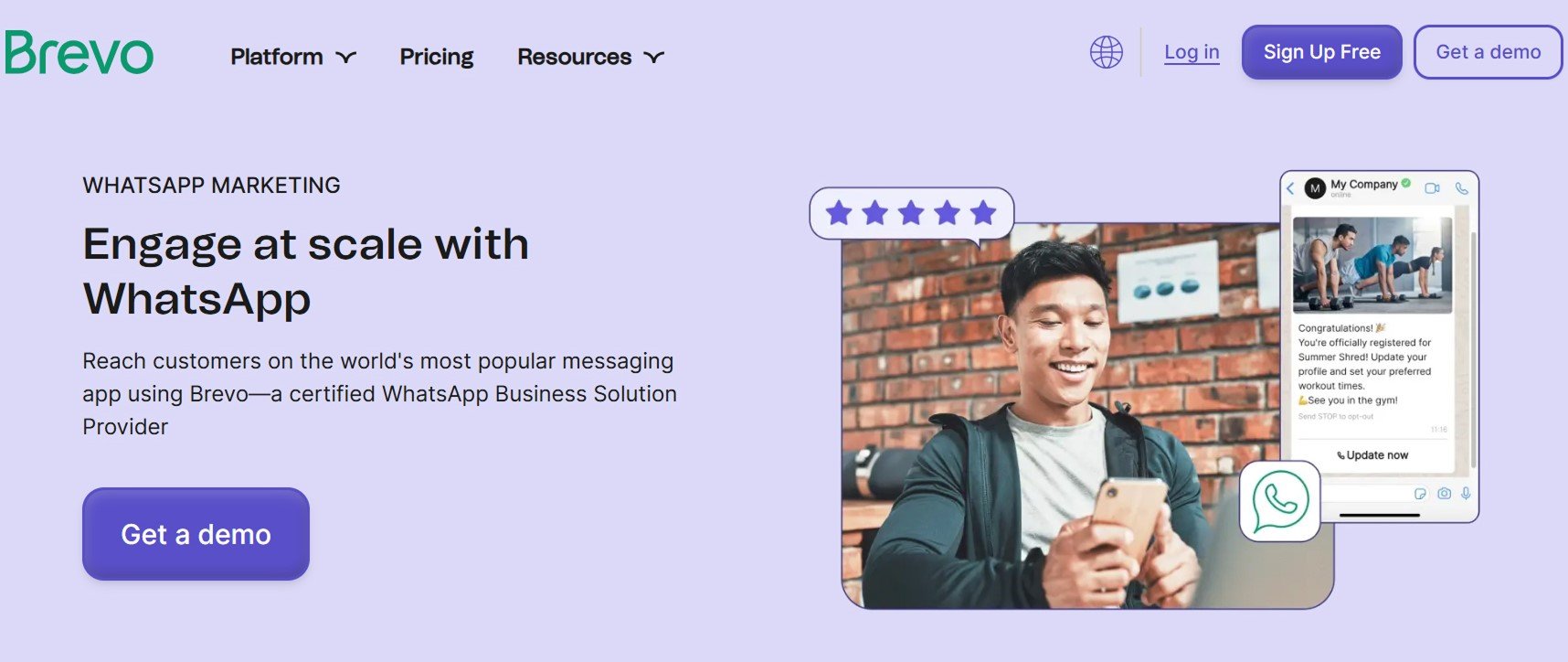
Brevo is best known for email and SMS marketing, but it now supports WhatsApp campaigns too. You can create targeted WhatsApp messages, use templates, and manage your entire communication strategy from one platform.
5. Respond.io
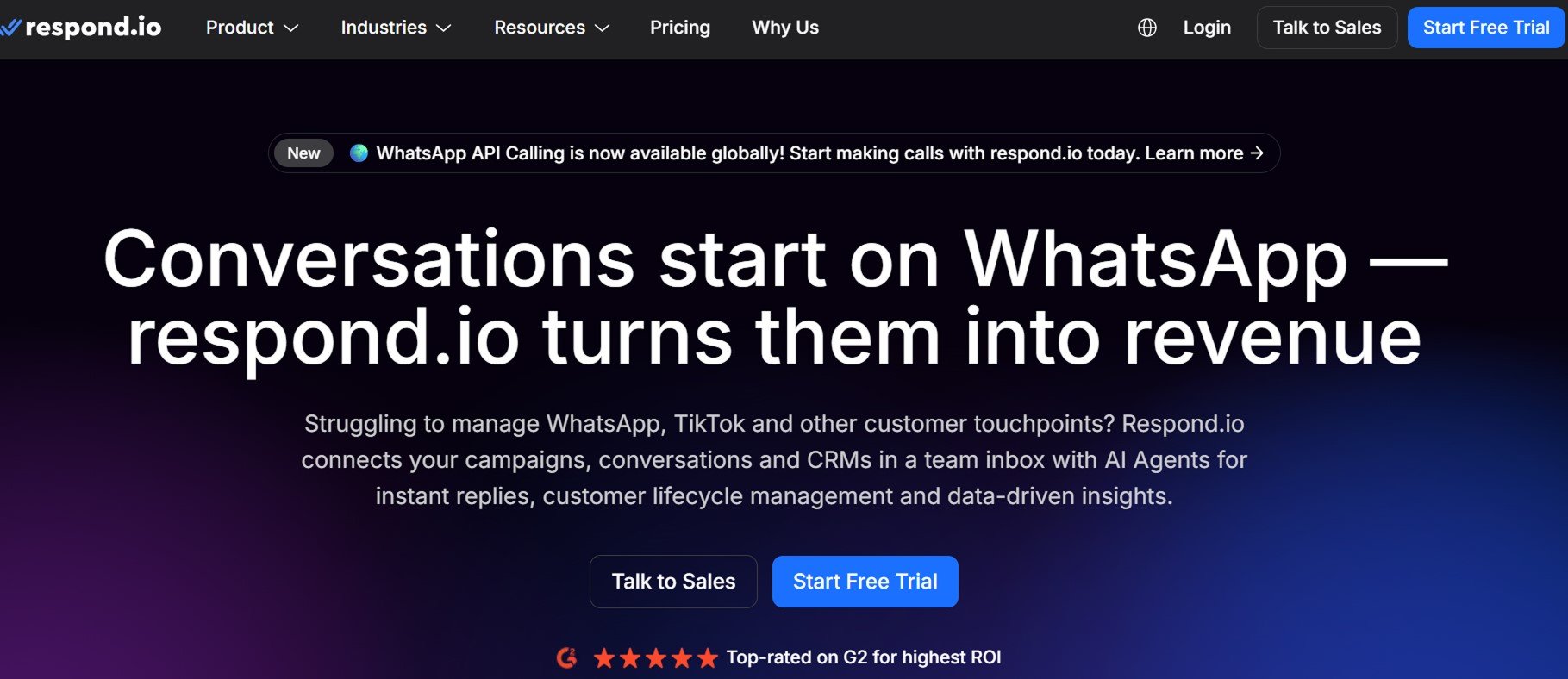
Respond.io brings all your customer messages from different sources like WhatsApp, Messenger, Instagram, and more into one shared inbox. It’s ideal for teams that want to centralize their communication and respond faster. The platform supports automation, workflows, and CRM integration, making it great for support and engagement.
Types of WhatsApp marketing services
Businesses that want to use WhatsApp marketing without building in-house expertise can rely on professional WhatsApp marketing services that offer comprehensive solutions. These agencies and service providers handle strategy, execution, and optimization of your WhatsApp marketing efforts.
Here are the different types of WhatsApp marketing services available in the market:
- Full-service WhatsApp marketing agencies: These agencies develop your complete WhatsApp marketing strategy, create content, manage campaigns, handle customer interactions, and provide analytics and optimization.
- WhatsApp Business API providers: As official Business Solution Providers, these companies help you set up and manage the WhatsApp Business API, integrate it with your systems, and provide technical support for enterprise-level WhatsApp marketing.
- Chatbot development services: Specialized firms that design, build, and maintain custom WhatsApp chatbots tailored to your business needs, customer journey, and specific use cases.
- Content creation services: Creative teams that produce engaging WhatsApp content, including copywriting, graphic design, video production, and interactive content specifically optimized for WhatsApp marketing.
- WhatsApp advertising services: Experts who manage click-to-WhatsApp ad campaigns on Facebook and Instagram, optimizing for lead generation and customer acquisition through paid advertising.
- Consulting and strategy services: WhatsApp marketing consultants who audit your current approach, develop comprehensive strategies, provide training for your team, and offer ongoing strategic guidance.
Overall, the type of WhatsApp marketing tool and service you need is dependent on your goals and available resources.
Conclusion
WhatsApp marketing offers exceptional engagement rates and enables businesses to build authentic customer relationships that traditional channels can’t match. The key is respecting the platform’s intimate nature by focusing on genuine conversations, not aggressive broadcasting.
Start with WhatsApp Business, leverage Status, Broadcasts, and Channels strategically, and always prioritize personalization over mass messaging. Implement these strategies today to transform your customer engagement and drive meaningful business growth.
FAQs
How to use WhatsApp for marketing?
Download WhatsApp Business, build your contact list with opt-in permission, and use Broadcast Lists, Status, and Channels to share valuable content. Personalize messages and balance promotional content with useful information.
How to use WhatsApp Business for marketing?
Set up your business profile with a catalog and automated messages. Use quick replies and labels for organization. Track analytics and upgrade to API for advanced features like chatbots and multi-agent support.
How to attract customers through WhatsApp?
Display your number on your website, social media, and emails. Use click-to-chat links and QR codes. Run targeted ads with WhatsApp buttons. Offer exclusive incentives to encourage sign-ups and referrals.
Recommended for you


Powerful social media management software
14-day free trial - No credit card required.
